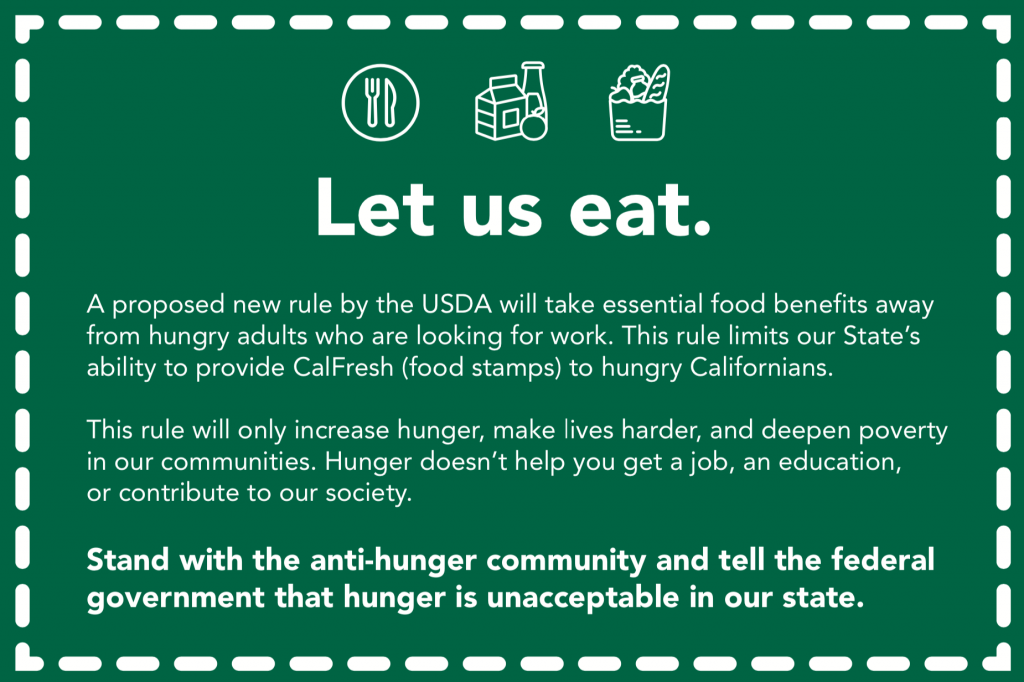Federal Government to Escalate Hunger throughout California
December 4, 2019
We do not offer food. Here’s where you can find food.
No distribuimos alimentos. Encuentre comida gratis aquí.
我們不直接提供食物,但我們能幫助您找尋食物。

Food Banks Respond to Final ABAWD Rule
Today, the federal government published a final rule enacting significant cuts to the Supplemental Nutrition Assistance Program (known as CalFresh in California, formerly as food stamps). The rule is scheduled to go into effect on April 1, 2020.
When enacted, this rule will impact basic food assistance for an estimated 700,000 Californians that are struggling to find work. This is a cut of historic proportions, the largest since the 1996 “Welfare Reform” Act. Contrary to the USDA’s rationale, in reality, this rule does not promote self-sufficiency, wellbeing, or economic mobility. Rather it targets our community members – like veterans and the formerly incarcerated – with the greatest barriers to work by making these individuals hungrier and poorer. It also places an impossible burden on food banks and other emergency food providers to fill in where our Federal Government falls short.
“California’s food banks have the already herculean task of feeding the increasing number of hungry community members,” said Andrew Cheyne, director of government affairs for the California Association of Food Banks. “This rule change is mean-spirited and only stands to cause widespread hunger in our communities. More than that, it’s grounded in the myth that people receiving food assistance are ‘lazy’ and don’t want to work. Nothing could be further from the truth: the people impacted by this rule have been systematically disenfranchised and face real barriers to maintaining and documenting full time employment. Taking away basic food assistance only makes people hungry, and does not help anyone find a job.”
This Federal rule undermines California’s ability to protect our low-income adults from the Able Bodied Adults Without Dependents time limit (the “ABAWD rule”). It will require almost every county to enforce the harsh time limit on providing nutrition assistance for adults who are working less than 20 hours each week, no matter how hard they are looking for a job, have irregular schedules, or are employed more than 20 hours a week but unable to document their hours. It further restricts the state’s ability to utilize the ‘bank’ of individual exemptions used to provide food assistance to those with the greatest barriers to work. Finally, it severely undercuts the ability of the program to respond during future recessions, weakening one of the most important anti-hunger and pro-employment features of the program.
The publication of this rule comes after two-years of deliberation and a significant debate about the role of SNAP in helping both working and out-of-work Americans prevent hunger and maintain employment or prepare to re-enter the workforce. The Farm Bill that passed in 2018 with historic bipartisan support that rejected cutting access to the program.
The finalizing and publication of this rule follows numerous similar attempts over the past two years to circumvent Congressional decision-making with proposed policies that seek to make it increasingly difficult for low-income Americans to receive the support they need.
We are as committed as ever to ending hunger and food insecurity. With 11.2% of Californians experiencing food insecurity and two of America’s hungriest cities—Bakersfield (1) and Fresno (3)—located in California’s Central Valley, which feeds the world, it is imperative that our state and national leaders take real action. SNAP, our nation’s most important anti-hunger program and California’s first line of defense against hunger, plays a vital role in this effort. We must stop these ongoing and cruel efforts to attack our neighbors who struggle with hunger and the program they rely on to eat. We look forward to opportunities to strengthen SNAP and the nutrition safety net that are proven to fight hunger and provide long-term health and economic benefits to our nation.
It is possible that litigation will be filed seeking relief from the damages this rule will cause, and if successful, would block it from taking effect. We urge all SNAP/CalFresh recipients to contact CAFB or your local food bank for more information about how you can prepare for this and maintain your food assistance.
Statements from our partners: